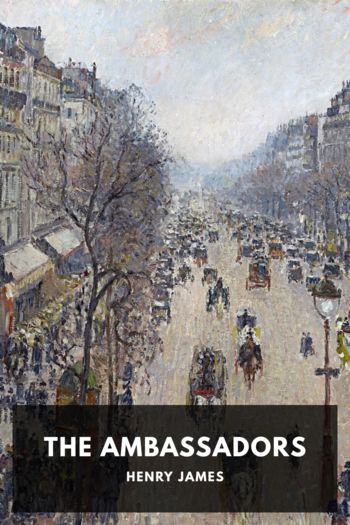The Ambassadors - Henry James (best ebook for manga .txt) 📗

- Author: Henry James
Book online «The Ambassadors - Henry James (best ebook for manga .txt) 📗». Author Henry James
“Ah doesn’t he?” Strether laughed.
Bilham met it with all his candour. “How then should I be here?”
“Oh for what you tell me. You’re part of the perfect choice.”
Well, the young man took in the scene. “It seems rather good today.”
Strether followed the direction of his eyes. “Are they all, this time, femmes du monde?”
Little Bilham showed his competence. “Pretty well.”
This was a category our friend had a feeling for; a light, romantic and mysterious, on the feminine element, in which he enjoyed for a little watching it. “Are there any Poles?”
His companion considered. “I think I make out a ‘Portuguee.’ But I’ve seen Turks.”
Strether wondered, desiring justice. “They seem—all the women—very harmonious.”
“Oh in closer quarters they come out!” And then, while Strether was aware of fearing closer quarters, though giving himself again to the harmonies, “Well,” little Bilham went on, “it is at the worst rather good, you know. If you like it, you feel it, this way, that shows you’re not in the least out. But you always know things,” he handsomely added, “immediately.”
Strether liked it and felt it only too much; so “I say, don’t lay traps for me!” he rather helplessly murmured.
“Well,” his companion returned, “he’s wonderfully kind to us.”
“To us Americans you mean?”
“Oh no—he doesn’t know anything about that. That’s half the battle here—that you can never hear politics. We don’t talk them. I mean to poor young wretches of all sorts. And yet it’s always as charming as this; it’s as if, by something in the air, our squalor didn’t show. It puts us all back—into the last century.”
“I’m afraid,” Strether said, amused, “that it puts me rather forward: oh ever so far!”
“Into the next? But isn’t that only,” little Bilham asked, “because you’re really of the century before?”
“The century before the last? Thank you!” Strether laughed. “If I ask you about some of the ladies it can’t be then that I may hope, as such a specimen of the rococo, to please them.”
“On the contrary they adore—we all adore here—the rococo, and where is there a better setting for it than the whole thing, the pavilion and the garden, together? There are lots of people with collections,” little Bilham smiled as he glanced round. “You’ll be secured!”
It made Strether for a moment give himself again to contemplation. There were faces he scarce knew what to make of. Were they charming or were they only strange? He mightn’t talk politics, yet he suspected a Pole or two. The upshot was the question at the back of his head from the moment his friend had joined him. “Have Madame de Vionnet and her daughter arrived?”
“I haven’t seen them yet, but Miss Gostrey has come. She’s in the pavilion looking at objects. One can see she’s a collector,” little Bilham added without offence.
“Oh yes, she’s a collector, and I knew she was to come. Is Madame de Vionnet a collector?” Strether went on.
“Rather, I believe; almost celebrated.” The young man met, on it, a little, his friend’s eyes. “I happen to know—from Chad, whom I saw last night—that they’ve come back; but only yesterday. He wasn’t sure—up to the last. This, accordingly,” little Bilham went on, “will be—if they are here—their first appearance after their return.”
Strether, very quickly, turned these things over. “Chad told you last night? To me, on our way here, he said nothing about it.”
“But did you ask him?”
Strether did him the justice. “I dare say not.”
“Well,” said little Bilham, “you’re not a person to whom it’s easy to tell things you don’t want to know. Though it is easy, I admit—it’s quite beautiful,” he benevolently added, “when you do want to.”
Strether looked at him with an indulgence that matched his intelligence. “Is that the deep reasoning on which—about these ladies—you’ve been yourself so silent?”
Little Bilham considered the depth of his reasoning. “I haven’t been silent. I spoke of them to you the other day, the day we sat together after Chad’s tea-party.”
Strether came round to it. “They then are the virtuous attachment?”
“I can only tell you that it’s what they pass for. But isn’t that enough? What more than a vain appearance does the wisest of us know? I commend you,” the young man declared with a pleasant emphasis, “the vain appearance.”
Strether looked more widely round, and what he saw, from face to face, deepened the effect of his young friend’s words. “Is it so good?”
“Magnificent.”
Strether had a pause. “The husband’s dead?”
“Dear no. Alive.”
“Oh!” said Strether. After which, as his companion laughed: “How then can it be so good?”
“You’ll see for yourself. One does see.”
“Chad’s in love with the daughter?”
“That’s what I mean.”
Strether wondered. “Then where’s the difficulty?”
“Why, aren’t you and I—with our grander bolder ideas?”
“Oh mine—!” Strether said rather strangely. But then as if to attenuate: “You mean they won’t hear of Woollett?”
Little Bilham smiled. “Isn’t that just what you must see about?”
It had brought them, as she caught the last words, into relation with Miss Barrace, whom Strether had already observed—as he had never before seen a lady at a party—moving about alone. Coming within sound of them she had already spoken, and she took again, through her long-handled glass, all her amused and amusing possession. “How much, poor Mr. Strether, you seem to have to see about! But you can’t say,” she gaily declared, “that I don’t do what I can to help you. Mr. Waymarsh is placed. I’ve left him in the house with Miss Gostrey.”
“The way,” little Bilham exclaimed, “Mr. Strether gets the ladies to work for him!





Comments (0)